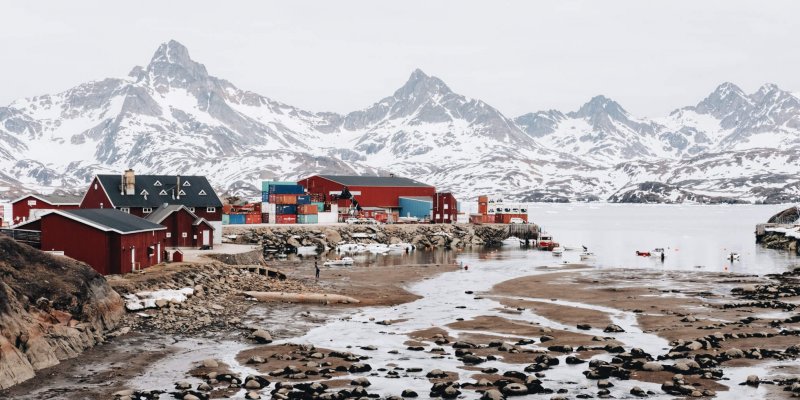Greenland Is on Track to Lose All Its Ice
If melting goes on at its present rate, the icy island nation could be in serious trouble in the long term. Tasiilaq harbor in East Greenland. By the year 3,000, Greenland may be ice-free. (Filip Gielda / Unsplash)
Tasiilaq harbor in East Greenland. By the year 3,000, Greenland may be ice-free. (Filip Gielda / Unsplash)
US scientists have just established that the long-term future may bring an ice-free Greenland, if melting continues at the current rate. By the year 3,000 it could simply be green, with rocky outcrops. Greenland’s icy mountains will have vanished.
By the end of this century, the island – the largest body of ice in the northern hemisphere, and home to 8% of the world’s fresh water in frozen form – will have lost 4.5% of its ice cover, and sea levels will have risen by up to 33cm.
And if melting continues, and the world goes on burning fossil fuels under climate science’s notorious “business as usual scenario”, then within another thousand years the entire cover will have run into the sea, which by then will have risen – just because of melting in Greenland – by more than seven metres, to wash away cities such as Miami, Los Angeles, Copenhagen, Shanghai and New Orleans.
“How Greenland will look in the future – in a couple of hundred years or in 1,000 years – whether there will be Greenland, or at least a Greenland similar to today, it’s up to us”, said Andy Aschwanden, of the University of Fairbanks, Alaska geophysical institute.
He and colleagues from the US and Denmark report in the journal Science Advances that they used new radar data that gave a picture of the thickness of the ice and the bedrock beneath it to estimate the total mass of ice.
We project that Greenland will very likely become ice-free within a millennium without substantial reduction in greenhouse gas emissions.
They then selected three possible climate outcomes, depending on national and political responses to the climate emergency, considered the rates at which glaciers had begun to flow, the levels of summer and even winter ice melt, and the warming of the oceans, and ran 500 computer simulations to form a picture of the future.
Researchers have been warning for years that the rate of ice loss in Greenland is accelerating. Ice is being lost from the ice sheet surface, in some places at such speed that the bedrock beneath, once crushed by the weight of ice, is beginning to rise.
The great frozen rivers that carry ice to the sea to form summer icebergs are themselves gathering pace: one of these in 2014 was recorded as having quadrupled in speed, to move at almost 50 metres a day.
Research in polar regions is always difficult, and conclusions are necessarily tentative. On-the-ground studies are limited in summer and all but impossible in winter. The dynamic of ice loss changes, depending on conditions both in the atmosphere and the surrounding ocean.
Greenhouse gas increase
But the Fairbanks study is consistent with a huge body of other research. And the same computer simulations confirm that what happens depends ultimately on whether the world continues to heat up as a consequence of the profligate consumption of fossil fuels that increase the ratio of greenhouse gases in the atmosphere.
If carbon dioxide emissions are sharply reduced, the scientists say, the picture changes. Instead, the island could lose only up to a quarter of its ice cover by the end of this millennium, with a corresponding sea level rise of up to 1.88 metres.
Another, less hopeful scenario foresees a loss of up to 57% and sea level rise of up to 4.17 metres. In the worst case, the range of possible ice loss is from 72% to the lot, with the oceans higher by up to 7.28 metres, all of it from the existing ice mass of Greenland.
“We project that Greenland will very likely become ice-free within a millennium without substantial reduction in greenhouse gas emissions,” the researchers conclude.
Your support matters…Independent journalism is under threat and overshadowed by heavily funded mainstream media.
You can help level the playing field. Become a member.
Your tax-deductible contribution keeps us digging beneath the headlines to give you thought-provoking, investigative reporting and analysis that unearths what's really happening- without compromise.
Give today to support our courageous, independent journalists.






You need to be a supporter to comment.
There are currently no responses to this article.
Be the first to respond.